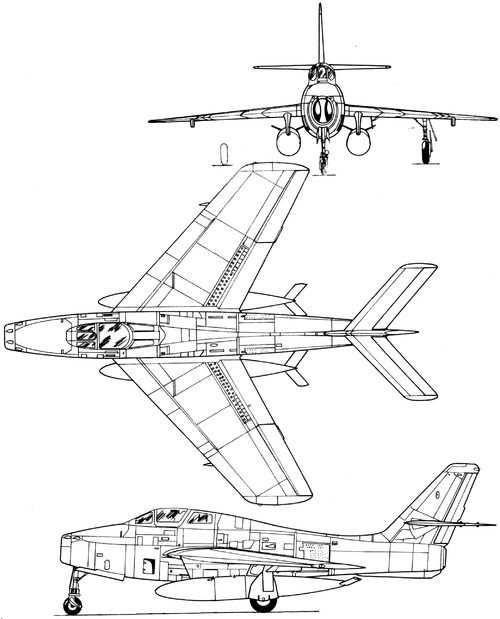First flown as a prototype in 1950, various design challenges meant the aircraft wouldn’t be certified operational until mid-1954.
In 1954, production for the F-84F began to provide the United States (US) Air Force and several Allied countries a ground support fighter-bomber. Soon after, as technology quickly progressed, the F-84F was replaced by supersonic F-100s. However, several F-84Fs were called back for temporary service due to the Berlin Crisis of 1958–1961, during the Cold War.

Serial Number: 51-1640
Manufacturer: Republic Aviation Corporation
Crew: One
Engines: One Wright J65-W-3 turbojet; 7,220 pounds thrust
Wingspan: 33 feet 7 1/4 inches
Length: 43 feet 4 3/4 inches
Height: 14 feet 4 3/4 inches
Weight: 14,014 pounds (empty); 28,000 pounds (maximum)
Speed: 535 mph (cruising); 695 mph (maximum)
Range: 2,140 miles with four 230-gallon drop tanks
Service Ceiling: 46,000 feet
Armament: Six .50-caliber machine guns; 6,000 pounds external ordnance
Cost: $769,000
Starting in 1952, Hill Air Force Base began its extensive depot maintenance and supply support for the F-84s. Some of the more specialized maintenance included repairs on the RF-84F and F-84F engine, the Buick-Wright J-65. Hill Air Force Base personnel accomplished depot maintenance on the F-84s until 1959. In total, more than 800 F-84s passed through the installation for repairs and were sent to back into service with units across the country. The F-84F on display was manufactured in 1954 and served on installations in the US and France. In 1983, Hill Aerospace Museum acquired the aircraft for permanent display.
First flown as a prototype in 1950, various design challenges meant the aircraft wouldn’t be certified operational until mid-1954.
Due to engine and other aircraft issues, the Thunderstreak was not predominately used during the Vietnam War.
By the mid-1960s the F-84F was predominately relegated to use by the Air National Guard, being replaced by the F-100 Super Sabre in the United States Air Force.